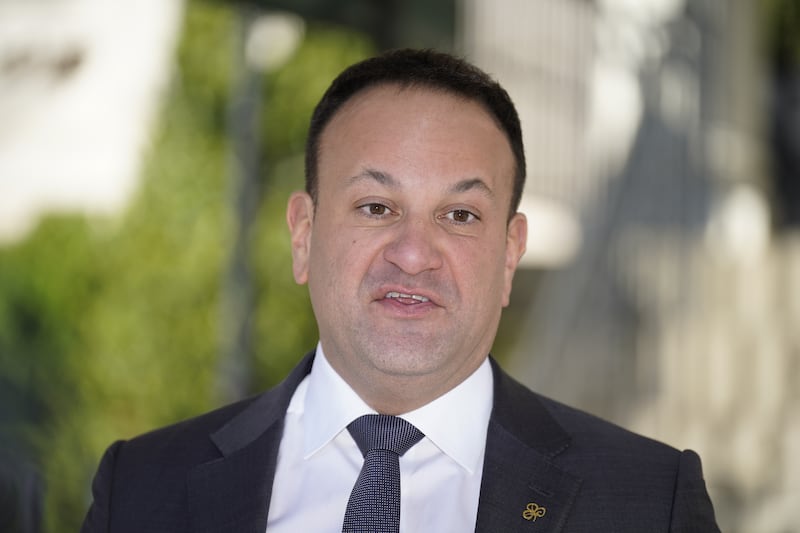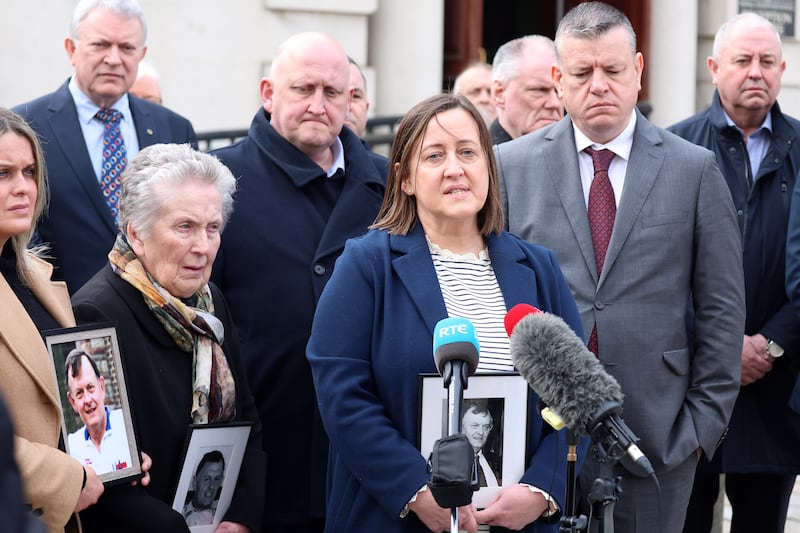Taoiseach Leo Varadkar has highlighted the need for “human rights compliant processes to address legacy cases” after “disturbing” details recently emerged about the loyalist murder of Co Derry GAA official Sean Brown.
The outgoing taoiseach, who is expected to be succeeded next week by new Fine Gael leader Simon Harris, raised his concerns in response to correspondence from Sinn Féin First Minister Michelle O’Neill.
The intervention comes after a coroner abandoned an inquest into the murder of Mr Brown last month and confirmed he was unable to complete the legal process due to PSNI and MI5 failures to disclose vital information.
Both made applications for multiple redactions to sensitive documents connected to the murder under Public Interest Immunity (PII).
PII certificates are used by state agencies to withhold sensitive information they do not want in the public domain.
Coroner Patrick Kinney, who is also a High Court judge, said last month he intended to write to Secretary of State Chris Heaton-Harris to request a public inquiry into the circumstances of Mr Brown’s murder.
It is understood a response is expected from the British government this week.
Mr Brown (61) was attacked, beaten and abducted by a LVF gang as he locked the gates at Bellaghy Wolfe Tones GAA club in May 1997.
He was then taken in the boot of his own car to a laneway near Randalstown, Co Antrim, where he was shot six times.
Before the collapse of his inquest the court had heard how more than 25 people had been linked by intelligence to the murder, including several state agents.
At earlier hearings it emerged that a suspect in the murder was believed to be a serving member of the Royal Irish Regiment while another suspect held a personal protection weapon and was regularly visited by a police officer at his home.
It has also been revealed that a surveillance operation, believed to have been carried out by the RUC, and centred on Mark ‘Swinger’ Fulton, a notorious member of the LVF in Mid Ulster, was lifted the night before the killing and picked up again the following morning.
Mr Varadkar’s response comes as the deadline for the completion of Troubles-linked inquests looms.
Under the British government’s controversial Legacy Act, which is being challenged by the Irish government at the European Court of Human Rights, it is planned to end all Troubles-related civil cases and halt inquests that are not at their findings stage by May 1.
Last month a High Court judge ruled that conditional immunity and plans to close down some civil actions are unlawful.
Under the new legislation, all Troubles investigations will transfer to the Independent Commission for Reconciliation and Information Recovery, which many victims are opposed to and believe is designed to protect state actors from accountability.

In his correspondence Mr Varadkar noted that “further disturbing information about the terrible circumstances of Sean’s death have come to light during the recent Public Interest Immunity process and my thoughts are with the family at this difficult time”.
“The information revealed in the inquest underlines the on-going value of, and need for human rights compliant processes to address legacy cases in Northern Ireland,” he said.
Mr Varadkar also referenced comments made by Tánaiste Micheál Martin in the Dáil last month during which he backed calls by Mr Brown’s family for a public inquiry.

Mr Brown’s daughter, Siobhan Brown, said her family welcomed “this positive and constructive intervention by the Taoiseach” in support of the coroner’s recommendation.
“We appreciate the taoiseach’s recognition of the harm caused to us by the Public Interest Immunity process,” she said.
Ms Brown said she hopes her family will be spared further distress.
“We trust that this public endorsement by the two most senior positions in Irish government, aligned with the views of the High Court Judge Mr Justice Kinney and the chief constable, who of course have read and considered the unredacted sensitive material, will empower Mr Heaton-Harris to do the right and proper thing and convene a public inquiry, a decision we expect to be made by this Wednesday.
“We hope and pray that he does not condemn us to a further protracted round of litigation, which is stressful to us as a family and further deepens our sense of injustice with regards to what happened to our father.”
The family’s solicitor, Niall Murphy of KRW Law, said it is “clear that the only lawful decision which can be made by the Secretary of State is to convene a public inquiry”.
A Northern Ireland Office spokesperson said:
“The government acknowledges the suffering caused by the murder of Sean Brown.
“The Legacy Act seeks to put in place effective information recovery for victims and families, while complying with our international obligations. The Secretary of State will give careful consideration to the coroner’s ruling.”








